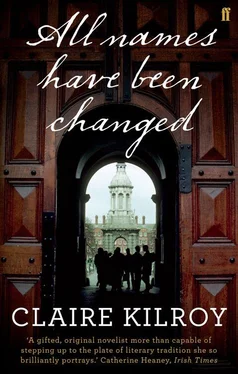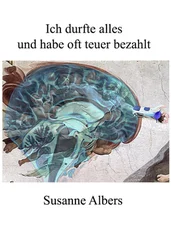Claire Kilroy - All Names Have Been Changed
Здесь есть возможность читать онлайн «Claire Kilroy - All Names Have Been Changed» весь текст электронной книги совершенно бесплатно (целиком полную версию без сокращений). В некоторых случаях можно слушать аудио, скачать через торрент в формате fb2 и присутствует краткое содержание. Год выпуска: 2010, Издательство: Faber & Faber, Жанр: Современная проза, на английском языке. Описание произведения, (предисловие) а так же отзывы посетителей доступны на портале библиотеки ЛибКат.
- Название:All Names Have Been Changed
- Автор:
- Издательство:Faber & Faber
- Жанр:
- Год:2010
- ISBN:нет данных
- Рейтинг книги:5 / 5. Голосов: 1
-
Избранное:Добавить в избранное
- Отзывы:
-
Ваша оценка:
- 100
- 1
- 2
- 3
- 4
- 5
All Names Have Been Changed: краткое содержание, описание и аннотация
Предлагаем к чтению аннотацию, описание, краткое содержание или предисловие (зависит от того, что написал сам автор книги «All Names Have Been Changed»). Если вы не нашли необходимую информацию о книге — напишите в комментариях, мы постараемся отыскать её.
All Names Have Been Changed — читать онлайн бесплатно полную книгу (весь текст) целиком
Ниже представлен текст книги, разбитый по страницам. Система сохранения места последней прочитанной страницы, позволяет с удобством читать онлайн бесплатно книгу «All Names Have Been Changed», без необходимости каждый раз заново искать на чём Вы остановились. Поставьте закладку, и сможете в любой момент перейти на страницу, на которой закончили чтение.
Интервал:
Закладка:
12 I’m an ordinary man, nothing special, nothing grand
We greatly enjoyed the succinct biographical notes which accompanied reissues of Glynn’s novels, never mind whether they were true. ‘He lives in Wicklow and Havana.’ ‘He is a leading exponent of the rural postmodern in Anglo Irish Literature.’ ‘He retired from active service in the Irish Free State’s Intelligence Corps when misdiagnosed with a wasting disease.’ These notes, written in the third person by the man himself, were neither outlandish enough nor specific enough to leap out at the casual reader as blatant lies. It was Faye who disabused us of their veracity, showcasing the formidable research skills that would stand to her in her future career. Although he had joined the FCA in his youth, there was no Irish Intelligence Corps as such, and even if there were, the likes of Glynn would hardly have been enlisted, not with his criminal record, minor though it was.
We came to regard his biographical notes as demonstrations in miniature of the power of fiction. No sooner had Glynn published them than they entered the realm of fact. He had altered the world with a pen stroke, the very mark of a god. Lazy journalists rushing to meet deadlines parroted variations on them, covering their tracks as best they could be bothered with thesauruses. Thus ‘Havana’ became ‘the Tropics’, Glynn’s alleged spell in the ‘Intelligence Corps’ became ‘Republican spy’, and his ‘wasting disease’ somehow morphed into ‘rumoured syphilis’. Superb, as Antonia would say, then the horsy laugh.
These concocted fragments evolved into a colourful portrait that offered more of an insight into the man’s playful spirit than a strict adherence to the bare nuts and bolts could have hoped to. For Glynn enjoyed parallel lives in his imagination, and it was his imaginative life above all else that those biographical notes sought to evoke, we concluded. What was a writer but his imaginative existence, after all?
It was true that he had been to Cuba just the once, and only for a week at that, but he never fully left it behind either. The place stole his heart, rendered him perpetually longing to return, escaping there on a regular basis in his daydreams, and so it could be said with some degree of conviction that part of Glynn did live in Havana, an important part, a substantial portion of his envisaging faculty, wandering down the narrow streets during the hot white noon while his earthbound self was tucked up in the leaba. We could all but see him in his crumpled linen, his jaunty fedora, seeking out the shade of the hibiscus or the respite of his favourite bar. Like a shaggy Irish wolfhound he would be, farcically ill adapted to the heat, an object of some curiosity and amusement to the locals, lying around panting in the shadows.
This notion of a doppelgänger, a southern señor Glynn, the Great Irish Writer in Exile, on tour, proved irresistible to us, particularly when it was raining. He understood exactly how to go about constructing his double, knew where best on the soft tissue of the mind to apply the electrodes to make his simulation of a man jolt into life and become one. The wrong imagery, and it mightn’t take. But aside from his biographical notes being a masterclass in creative writing, it was their freedom that most appealed to us, this proffering of alternative versions of the self, just like that, with the insertion of an adjective, the souping up of a noun. For we were not there to continue being the people we had previously been, either. That was not our objective in enrolling on the course.
Glynn, or ‘Professor Patrick Glynn, Writer Fellow’, as the brushed-steel nameplate slotted into the door of his office in the Department of English read, finally appeared in the middle distance of Front Square. It was a cold bright morning in early December.
The walled college campus was divided into sections as distinct as the rooms in a home. Each section represented a different era in European architecture. Front Square, accessed via the Arch on College Green, was an eighteenth-century neoclassical tableau. The Arts Block, fronting onto Nassau Street, and towards which Glynn was presently headed, was a cement box homage to the nineteen seventies, the façade of which broke out in large weeping sores when it rained, as it often did in Dublin, lending the building a bleak, bedraggled appearance. It failed in its purpose to be a monument to the consolations offered by the arts and humanities, to act as a bulwark against the Irish winter. Small wonder we conceived of Glynn as being elsewhere. We rarely, if ever, pictured him in his office in the Department of English, despite it being his place of employment. As backdrops went, the Arts Block didn’t live up to him.
Upon encountering the narrow passage between the 1937 Reading Room and the Colonnades (which wasn’t all that narrow — it merely seemed so in contrast to the gracious expanse of Front Square) those approaching from the other side faltered and deferred right of way to Glynn, who proceeded without so much as checking his pace, nor registering the guard of honour of stalled students lined up on either side of the passage through which some minutes earlier I myself had slipped, unnoticed.
Glynn crossed the smooth worn cobbles flanking New Square. The gradient of the ramp leading up to the Arts Block appeared to cause him undue difficulty. He lost impetus and ground to a halt halfway up, as if the ramp were a taxing paragraph he would return to later, once he had mustered his resources. He leaned against the railing and checked his watch. Only thirteen minutes late: Grand so. He lit a cigarette.
That a literary colossus should struggle with a ramp was what you might call a paradox. From an elevated position, it was evident that Glynn was beginning to thin at the crown. He ran a protective hand over his hair, somehow sensing that it had become the focus of negtive attention. He scanned the faces of the students milling about him, then squinted up in my direction, where I stood at a window on the third floor of the Arts Block, trained on him like a sniper. Could he see me? Hard to say.
Glynn stamped out his cigarette and finally gained the ramp. I lost sight of him until he reappeared at the far end of the English Department corridor, a full nineteen minutes late for our appointment.
‘You wanted to see me, Professor?’ It was a rhetorical question. I was reminding him, not asking him, because Glynn patently didn’t want to see me at all.
‘That’s right,’ he conceded. He’d asked me at the end of the last workshop to schedule a private appointment with him in his office later that week. I asked Aisling whether he’d issued the same request to the others. She told me he had not. Glynn unpinned the few notes thumb-tacked to his message board and unlocked the door, ushering me in ahead of him.
His office was the first disappointment. I had anticipated stepping into my favourite photograph of him, I suppose: bay window, mahogany table, tiny glinting sceptre. I had failed to deduce that a Georgian window could not exist in a modern building like the Arts Block.
‘Have a seat,’ said Glynn, indicating a tomato-red plastic chair, as he settled himself behind a metal desk.
It was uncomfortable, having him to myself like that. We had never been alone together. Wait, that’s a lie. There was a preponderance of red biros on his desk, which I thought at the time was part of some intriguing system he’d devised to inspire himself, because everything was a big secret then, everything was alchemical and occult and enthralling. Glynn was frowning at one of the notes he’d untacked from his message board. It wasn’t written on foolscap like the other notes, but instead on a pale blue sheet of watermarked writing paper, the kind of stationery used by old ladies and priests. He put his glasses on and sat riveted to the page. ‘Be with you in a second,’ he murmured.
Читать дальшеИнтервал:
Закладка:
Похожие книги на «All Names Have Been Changed»
Представляем Вашему вниманию похожие книги на «All Names Have Been Changed» списком для выбора. Мы отобрали схожую по названию и смыслу литературу в надежде предоставить читателям больше вариантов отыскать новые, интересные, ещё непрочитанные произведения.
Обсуждение, отзывы о книге «All Names Have Been Changed» и просто собственные мнения читателей. Оставьте ваши комментарии, напишите, что Вы думаете о произведении, его смысле или главных героях. Укажите что конкретно понравилось, а что нет, и почему Вы так считаете.












